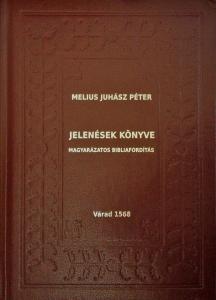
Jelenések könyve. Magyarázatos bibliafordítás
Jelenések könyve. Magyarázatos bibliafordítás
(Book of Revelation. Annotated Bible Translation)
Translated by Péter Méliusz Juhász
Várad 1568
Facsimile edition
Edited by László Ötvös
Foreword written by László Tőkés
NSZL– László Ötvös, Budapest–Debrecen, 2017, 616 pages
ISBN 978 615 806 511 5
A good sign of the dynamic of research in church history is the appearance of a succession of copies of our 16th and 17th century Hungarian Bible translations and editions. The original editions of these works are often difficult to access today, and research into them has been hampered. The new editions are now more accessible to historians of church, literature, books, printing and culture, as well as to lovers and readers of fine books. The facsimiles will also give a new impetus to research by bringing works back to the centre of attention and thus generating new research results.
From the translations of the renowned Debrecen preacher and superintendent of Tiszántúli, Péter Melius Juhász (1532-1572), in 2008 the Szent Jób Könyve (1565), in 2010 the Az két Sámuel Könyveinek, és az két Királyi Könyveknek... (1565), and in 2011, A Szent Pal apastal levelenec, mellyet a colossabelieknec irt, predicacio szerent valo magyarázattya (1561), were published in a double edition. The series is now continued by the facsimile edition of A Szent Jánosnac tött jelenésnec igaz és írás szerint való magyarázása..., published in 1568 in Nagyvárad (Oradea) in the printing house of Rudolf Hoffhalter, with a foreword by László Tőkés.
Peter Melius Juhász also felt it was his duty to translate the entire Bible into Hungarian: "As preachers, so God desires that the believers should be preached to in their native tongue, and not fooled by words without a foreign sense. So also He wants the Bible to be in every language, and that all may understand his will," writes Melius. Furthermore, we need to translate the Bible into our own mother tongue because "although we know a little in Latin, many of us do not understand the Bible we are reading". He, unlike the Erasmus scholars, did not see the translation of the Bible into Hungarian as a linguistic task, but "to edify the Christian brethren who desire it, by the beautiful true sense and interpretation of the word of the Lord". Like the scholarly workshop in Kolozsvár led by Gáspár Heltai, he wanted to carry out his Bible translation programme in parts. Unfortunately, his short life prevented him from doing so.
Shopping
Our publications are available in our bookshop, or can be ordered from the Publications Department of the NSZL using the contact details below: Főigazgatói Kabinet kiadványtára, Országos Széchényi Könyvtár, 1276 Budapest P.O. box 1205., phone: 06-1-23-23-506, e-mail: kiadvanytar@oszk.hu.




